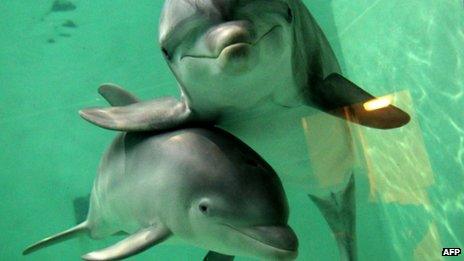Dolphins deserve same rights as humans, say scientists
- Published

Recognising the rights of dolphins would end whaling and their captivity
Dolphins should be treated as non-human "persons", with their rights to life and liberty respected, scientists meeting in Canada have been told.
Experts in philosophy, conservation and animal behaviour want support for a Declaration of Rights for Cetaceans.
They believe dolphins and whales are sufficiently intelligent to justify the same ethical considerations as humans.
Recognising their rights would mean an end to whaling and their captivity, or their use in entertainment.
The move was made at the annual meeting of the American Association for the Advancement of Science (AAAS) in Vancouver, Canada, the world's biggest science conference.
It is based on years of research that has shown dolphins and whales have large, complex brains and a human-like level of self-awareness.
This has led the experts to conclude that although non-human, dolphins and whales are "people" in a philosophical sense, which has far-reaching implications.
'Self-aware'
Ethics expert Prof Tom White, from Loyola Marymount University, Los Angeles, author of In Defence of Dolphins: The New Moral Frontier, said dolphins were "non-human persons".
"A person needs to be an individual. If individuals count, then the deliberate killing of individuals of this sort is ethically the equivalent of deliberately killing a human being.
"We're saying the science has shown that individuality - consciousness, self-awareness - is no longer a unique human property. That poses all kinds of challenges."
The declaration, originally agreed in May 2010, contains the statements "every individual cetacean has the right to life", "no cetacean should be held in captivity or servitude, be subject to cruel treatment, or be removed from their natural environment", and "no cetacean is the property of any state, corporation, human group or individual".
It adds: "The rights, freedoms and norms set forth in this declaration should be protected under international and domestic law."
Psychologist Dr Lori Marino, from Emory University in Atlanta, told how scientific advances had changed the view of the cetacean brain.
She said: "We went from seeing the dolphin/whale brain as being a giant amorphous blob that doesn't carry a lot of intelligence and complexity to not only being an enormous brain but an enormous brain with an enormous amount of complexity, and a complexity that rivals our own."
Dolphins had a sense of self which could be tested by the way they recognise themselves in mirrors, she added.
"When you get up in the morning and look in the mirror and know that's you, you have a sense of 'you'," said Dr Marino.
"They have a similar sense. They can look in a mirror and say, 'Hey, that's me'."
- Published7 February 2012
- Published11 July 2011
- Published21 November 2011